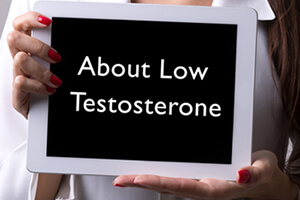The benefits and risks of testosterone therapy
Testosterone is known as the “male hormone” but is present in both men and women. In men, it is produced mainly in the testicles.
Testosterone effects:
- Muscle strength and mass
- Facial and body hair
- Sex drive
- Sperm production
- Bone density
- Fat distribution
- Red blood cell production
- Exercise tolerance
- Mood
Testosterone levels usually peak during adolescence and the early 20s and gradually decline with age. Low testosterone levels may be due to a problem with the testicles or the pituitary gland (in the brain) that controls production of testosterone.
In older men, low testosterone levels may represent the normal aging process. This is known as “hypogonadism of aging.” A health care provider can help determine if a low testosterone level needs to be treated. There are benefits and risks to testosterone therapy and each person’s personal health situation must be considered carefully.
Men with low testosterone may experience:
- loss of sex drive
- erection problems
- sleep problems
- difficulty with exercise
- weakened bones
- depressed mood
- less energy or motivation
Some of these signs and symptoms may be caused by other factors such as medication side effects, thyroid problems, diabetes, obstructive sleep apnea or depression. A blood test is the only way to diagnose a low testosterone level.
Health care providers may prescribe testosterone in the form of injections, patches, pills, pellets or gels. People receiving testosterone replacement therapy often experience an increase in energy, sex drive, sleep and muscle mass.
The side effects of the therapy may include:
- symptoms of an enlarged prostate, such as trouble urinating
- blisters, itching, or redness on the skin (if using a patch or a gel)
- reduced or absent sperm production (infertility)
- sleep apnea
- acne
People can naturally increase their testosterone level by practicing good health habits, such as:
- healthy diet
- good sleep hygiene
- regular exercise
- stress management
If you think you could be experiencing low testosterone levels, or to find out if you’d be a good candidate for replacement therapy or to learn more, please talk with your health care provider.
